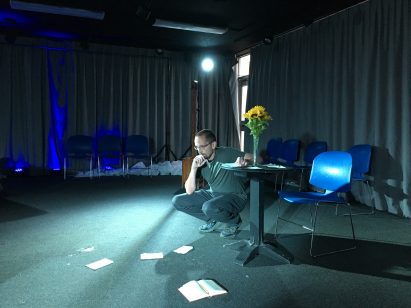The University of Idaho Department of Theatre is set to showcase “A Kind of Alaska,” a play revolving around a woman who struggles to come to terms with a new reality as she awakens from a deep slumber.
The 45-minute show, which opens Sept. 13, is written by famous playwright Harold Pinter and will be directed by Ricky Kimball, a Masters of Fine Arts student. Kimball has nine years of experience as a director.
The story revolves around Deborah, played by UI student Whitney Holland, who suffers from a sleep disease, which caused her to fall into a deep slumber. Deborah, now 45 years old, awakens after sleeping for 29 years.
“The thing about Deborah is that she is very reluctant to give up the sense of reality that she has, which is her dream state … her being 16, her sister being 12 and younger than her,” Kimball said. “She realizes that her memories shape who she is as a person.”
Deborah awakens with the help of an injection given by her doctor, Hornby, who is played by David Harlan, an instructor in the theatre department.
In the play, Hornby and Deborah’s sister Pauline, played by UI student Kymber Dodd, try to help a disoriented Deborah gain a sense of what has happened to her and help her come to terms with the world that has continued to progress without her.
“The play takes place right after Deborah awakens, so she keeps slipping into the state of reality that she’s in and into her subconscious dream state,” Kimball said. “As Deborah slips in and out of reality, the set, lights and soundwise shifts. The great thing about our production of it is we’re really using the space to have the audience see the play from Deborah’s point of view.”
Dodd said Deborah may physically be 45, but she still has the mind of a 16-year-old.
“I feel Deborah is kind of a mirror of a lot of us and the fact that our self-identities are connected to facts and events about ourselves,” Kimball said. “There are things about ourselves that we believe in that shape who we are as people and whenever that gets challenged by other people, we fight back against that.”
In Deborah’s dream state, Kimball said the audience can see a young Deborah — her perception of herself when she was 16 years old.

May Ng | Argonaut
The cast of “A Kind of Alaska” rehearses their 45-minute show, which opens Sept. 13.
He said the character of young Deborah was one they decided to add in their production and did not exist in the original script.
Young Deborah is played by Teliha Kokuba. From Okinawa, Japan, Kokuba is currently in her first semester of the UI Global Student Success Program. Once she completes the program, she plans to major in theatre arts.
Kokuba, who arrived in the U.S. only three weeks ago, said this is all very new and challenging to her, but she is eager to learn all she can about theatre.
She said people here are more aggressive in expressing feelings; whereas in Japan, they tend to hide their feelings.
“I really don’t have experience of like showing feelings a lot,” Kokuba said. “I try to, but a little bit of shame came in and I have to rip that shame out from my mind.”
Dodd said this play will not be a typical show where the audience sits on one side of the space while the actors occupy the other. Audience members will be seated around the room.
“People can move, people can adjust what they’re doing,” Dodd said. “We don’t want that theatre etiquette — sit quietly and don’t do anything.”
The play opens next week at the Pocket Playhouse, located in Shoup Hall, Room 100. It will run for two weekends without an intermission.
Kelly O’Neill, a theatre department spokesperson, said the play is free for UI students and discounted for children, seniors and UI staff and faculty. But due to limited seating, they will only admit about 35 people for each show.
O’Neill said tickets — $15 for the general public — are available now and recommends audience members get tickets in advance as admission will be on a first-come, first-serve basis.
Tickets can be purchased at Shoup Hall, Room 201, or by calling 208-885-6465.
O’Neill said all 2 p.m. matinees — Sept. 16 and Sept. 23 — for this show are “pay what you can.”
“We don’t want to discourage people who want to come see the show but are short on money,” Dodd said. “We want everybody to watch the show. We want it to be a full, inclusive experience and we want everyone to see what theatre can really be and not what everyone says. It’s like this really strict you-gotta-follow-the-rules-to-watch-theatre. We don’t want that.”
May Ng can be reached at [email protected]
